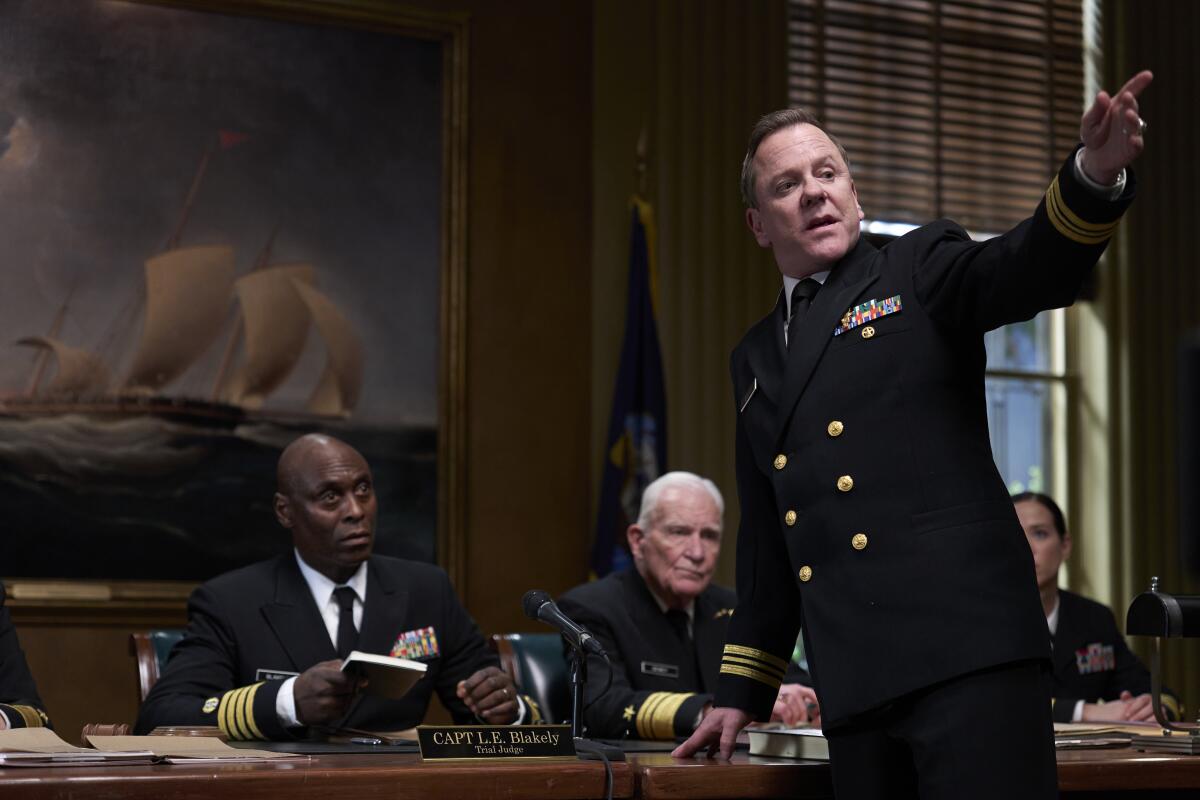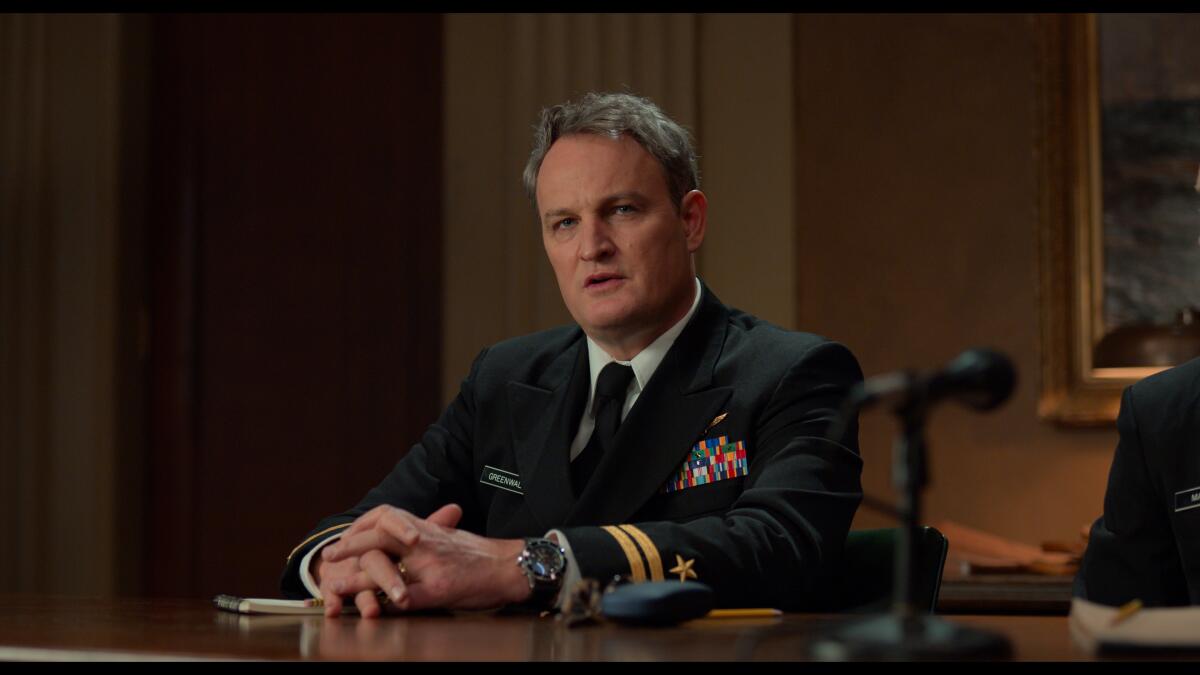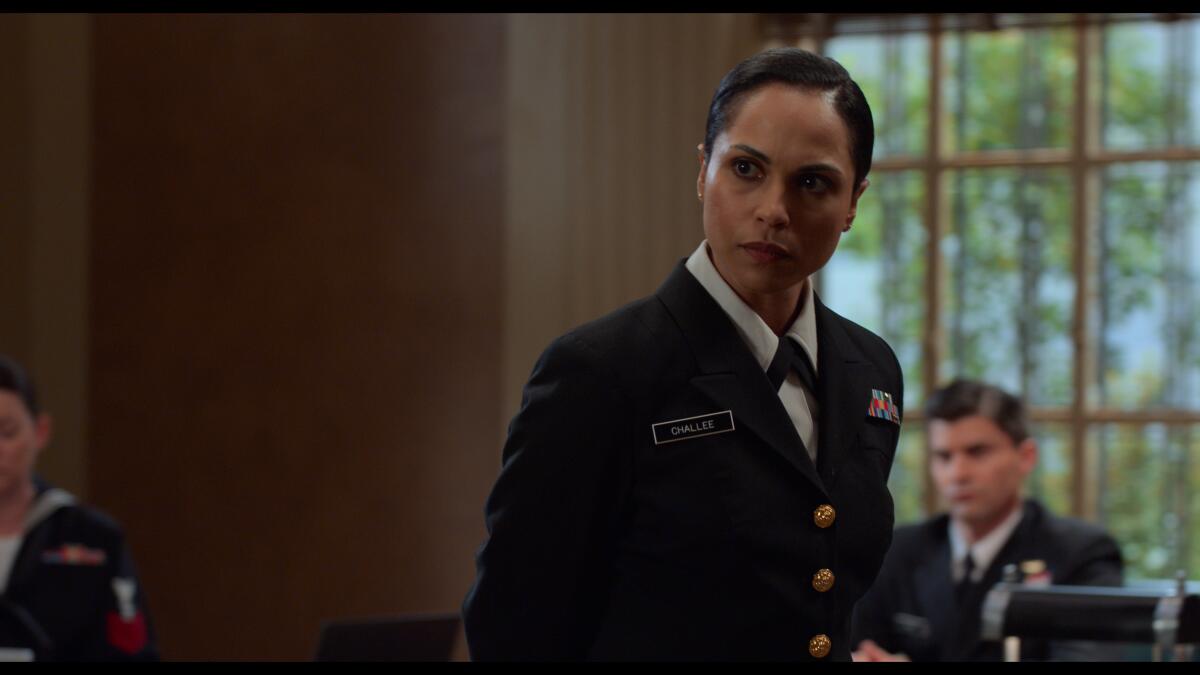Review: ‘The Caine Mutiny Court-Martial’ is a gripping swan song for director William Friedkin

- Share via
The final scene of “The Caine Mutiny Court-Martial” takes place at a party where one military man pays tribute to another in the form of a long, candid and unexpectedly bitter toast. The bitterness is mostly directed inward: Barney Greenwald (Jason Clarke), a naval aviator turned attorney, has many regrets, including his own expert performance in the recently wrapped military trial of the title. His tongue freed from legal formalities and further loosened by liquor, Greenwald rails against his own complicity in a major act of injustice, ending his speech with a gesture that, if you don’t know it’s coming, is well worth seeing for yourself. It’s a hell of a parting shot, both for this swift, absorbing movie and for its director, William Friedkin, who died in August at the age of 87.
Whether or not Friedkin knew that this movie would be his final work, there’s a temptation to cast about for deeper significance in his choice of material. (The film begins streaming Oct. 6 on Paramount+ With Showtime and begins airing Oct. 8 on Showtime.) Is Greenwald a stand-in for this famously outspoken Hollywood iconoclast, condemning the irredeemable rottenness of the system that employed him? Did Friedkin, so often fixated on questions of guilt and innocence, mean to direct a career-capping bookend to his 1962 directing debut, the documentary “The People vs. Paul Crump” — or perhaps a companion to his 2000 court-martial drama, “Rules of Engagement”? Was the abruptness of the filmmaker’s death, just weeks before “The Caine Mutiny Court-Martial’s” premiere at the Venice International Film Festival, somehow presaged by this story’s startling, oddly satisfying cut to black?
Maybe it’s best not to speculate; loose lips sink ships, or at least they can come perilously close. That’s one of the lessons of both “The Caine Mutiny,” Herman Wouk’s Pulitzer Prize-winning 1952 novel, and “The Caine Mutiny Court-Martial,” the 1953 stage play he adapted from it. While the novel famously inspired an Oscar-nominated 1954 film starring Humphrey Bogart, it’s unsurprising that the play, with its leaner, thriftier spin on the same material, has been adapted so often for television (notably in 1988, with Robert Altman directing). The play’s accomplishment is to situate Wouk’s nautical epic within the parameters of a courtroom drama, relating an epic of insubordination, paranoia and stormy weather amid a sea of conflicting testimonies and legal protocols.

Not much has changed in Friedkin’s adaptation, beyond the fact that the U.S.S. Caine, a Navy destroyer that previously sailed through the Pacific theater of World War II (a conflict in which Wouk himself served), now does its minesweeping in the present-day Persian Gulf. The ship’s executive officer, Lt. Stephen Maryk (Jake Lacy), stands accused of unjustly deposing Lt. Cmdr. Phillip Queeg (Kiefer Sutherland), the Caine’s captain and a two-decade Navy veteran. And Greenwald, who thinks Maryk is “guilty as hell,” defends him reluctantly but brilliantly, questioning Queeg’s competence as a commanding officer by placing his often-dubious leadership tactics on trial.
Greenwald’s case builds slowly in a film that nonetheless speeds ahead, thanks to the screw-tightening focus of Friedkin’s direction and his knack for bringing a single-location setup to cinematic life. His skill in this arena will hardly come as a surprise to those familiar with his earlier stage-to-screen adaptations, from “The Birthday Party” (1968) and “The Boys in the Band” (1970) to his unnervingly claustrophobic Tracy Letts adaptations, “Bug” (2006) and “Killer Joe” (2011). In “The Caine Mutiny Court-Martial,” Friedkin holds you rapt with the nimbleness of his camera placement (the sharp cinematography is by Michael Grady), the crispness of Darrin Navarro’s editing and, above all, the initially stiff but ultimately spellbinding rhetorical force of the actors.
They deliver the text with immaculate polish; even Gabe Kessler, as a petty officer who nervously takes the stand, seems to have nailed every stutter. More assured in their diction are a series of witnesses (Lewis Pullman, Tom Riley, Elizabeth Anweis, Jay Duplass) brought in to speak to Queeg’s state of mind, establishing a tension between those required to serve under him aboard ship and those tasked with subjecting him to psychological tests after the fact. Through all this, Friedkin surveys each participant with a fascinatingly even-keeled gaze. Maryk, in Lacy’s fine performance, seems by turns honest, shifty, competent and foolish; Clarke, playing a government interrogator for the second time this year after “Oppenheimer,” keeps Greenwald’s deeper motives skillfully under wraps.

At issue in the case is not just a captain’s fitness to serve but the level of respect that should be accorded the military itself. Here, the strict traditions and rigorous codes of conduct can’t help but command a measure of awe; two of the most memorable performances are given by Monica Raymund as the trial’s eloquently withering prosecutor and the late, great Lance Reddick as the captain serving as the trial’s hyper-observant, fair-minded judge. Throughout the trial, their insistence on not just fairness but decorum is both admirable and, in the context of an insubordination trial, faintly troubling. Whether or not a young lieutenant like Maryk can receive due process is a valid question when a venerable veteran like Queeg is assumed to be entitled to the benefit of the doubt.
But Sutherland’s performance as Queeg, a role that Bogart made famous, brilliantly and movingly undermines that assumption. There is something ingeniously counterintuitive about having the actor best known for playing Jack Bauer on “24” being cast here as a military commander who tends to lose his nerve under pressure. Questioned about his possible misconduct aboard the Caine, Sutherland’s Queeg turns fatally defensive, his voice scraping gravel, his eyes peering into a middle distance only he can see. He is dismissed as a paranoiac, a coward, an abuser of his authority, and his raging, rambling testimony all but seems to confirm the truth of these allegations.
And yet the camera never betrays him. Queeg’s fragility is laid so wrenchingly bare that you can’t help but feel for him, and you suspect that on some level, Friedkin does too. Perhaps this is what drew him to “The Caine Mutiny Court-Martial”: the chance to shine a sympathetic spotlight on a man known and despised for his impossible stubbornness, his career-long refusal to compromise.
Did the famously unyielding Friedkin see a trace of himself in Queeg? Perhaps no more and no less than he saw himself in the tormented antiheroes of “The French Connection,” “The Exorcist,” “Cruising,” “Sorcerer” and many others: men who lived determinedly, ferociously and sometimes inscrutably by their own dark codes.
More to Read
Only good movies
Get the Indie Focus newsletter, Mark Olsen's weekly guide to the world of cinema.
You may occasionally receive promotional content from the Los Angeles Times.











